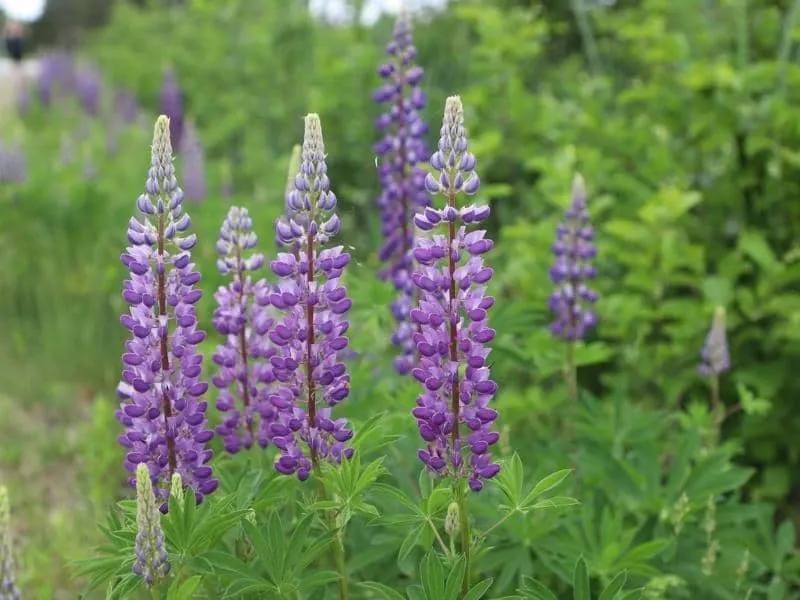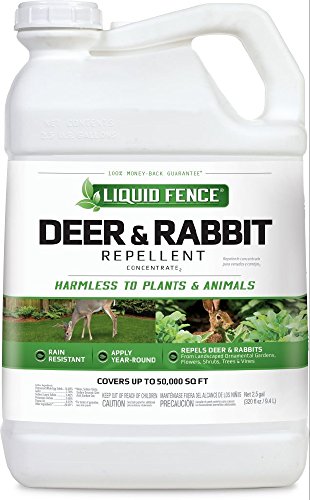Lupine is a low-maintenance, damage-proof, perennial flower plant that has more than 200 species around the world.
They usually bloom from spring to Midsummer and provide serene beauty in the garden. In today’s article, we will discuss if the deer eats Lupine.
Do deer eat lupine?
The deer do not like to eat lupine all the time. It is considered a deer-resistant plant. Although these plants and flowers add extra beauty to your garden, deer are not attracted to it. It is the color of the flowers and the bad taste that keeps the deer from eating these plants and flowers.
Table of Contents

Lupine is considered a popular deer-resistant perennial plant that you can grow in your garden. The lupine blooms from the beginning of spring to the Midsummer. The flowers are available in bright and beautiful colors.
Lupine is considered a low-maintenance plant because it takes very less space to grow. In addition to that, it can grow properly in full sunlight.
Once they grow up, they can be considered deer-resistant plants, because the lupine flowers and their smell of them are not liked by deer. As a result, it can be a great option to keep the deer away from your garden.
Generally, if you are living in a deer-infested area, you may have faced unwanted deer invasion very frequently. Usually, the deer comes from the wild in search of food. They use their smelling sense to search for food around them.
In some cases, they may invade your garden and eat the plants, herbs as well as leaves and cause serious damage to the garden. If the deer keeps eating your plants and leaves, this will disrupt their growth and reduce the beauty of your garden.
That is why you can try planting Lupine in your garden to keep the deer away from the garden.
There are more than 200 species of Lupines available, and most of them are good deer-resistant plants. Below is a brief discussion on a few types of lupines and discussed if they are deer resistant or not:
Lupine:
Generally, the deer do not tend to eat Lupines because they are available in bright colors and spread a fragrance that is disliked by the deer.
Although, there is a high possibility that the deer may still come into the garden and eat the lupines if they are hungry enough and in search of food.
Blue lupine or Wild lupine:
The deer will not eat the blue lupine or wild lupine. They do not like the flowers at all.
The deer tend to eat anything when they are hungry. Since they are called adaptive animals, they may eat the lupines.
Staircase lupine:
No, the deer will not eat the staircase lupine because they do not like the flower and the smell of it. That is why it can be considered an effective option to plant in the garden and prevent the deer from coming inside of it.
You are living in an area where your garden may get invaded by deer frequently. You can try planting Lupines in the garden.
Are lupine deer resistant or deer-proof?
Lupine is considered a deer-resistant plant that most gardeners prefer to use in their garden to keep the deer away from it. The lupine provides you with perennial flowers, which will bloom from spring to Midsummer.
During this long time, it will help your garden to protect it from unwanted deer invasion. Generally, the lupine provides bush structural plants and bright colored flowers, which the deer do not like.
That is why they simply avoid the plants and do not get close to them. Lupines can also be helpful to make your garden deer resistant by planting them surrounding the garden as a cheap fence option to make the fencing efficient.
But it will not make the garden deer-proof. Since deer are an adaptive animal, they can eat anything when they are hungry. So, there is a chance that the lupines may get eaten by the deer if they are hungry and desperate in search of food.
In that case, it is still beneficial to plant Lupines in your garden, because if the deer choose to eat the leaves and flowers from the lupines, it will save the other plants. This will let the other plants grow properly without getting damaged by the deer.
Below is a brief discussion on whether the different parts of lupine are deer resistant or deer-proof:
Lupine flowers:
Lupine flowers are considered deer-proof because the deer do not like to get closer to the flower for its color and smell. The deer simply cannot resist the smell of lupine flowers. So, they will usually not eat them.
Lupine plants:
There’s a chance that the lupine plants make the garden deer resistant, but this will not make it deer-proof.
Because the deer likes to eat the leaves from the plants. So, the deer may still invade the garden and eat the leaves from the plants.
Do deer like lupine?
No, the deer do not like lupine. That is why many gardeners prefer to plant it as a deer-resistant plant in their garden. The deer do not like the smell of the lupine flowers and the Bush structure.
In addition to that, the lupine plans will only make your garden deer resistant, but not deer-proof.
Since the deer is an adaptive animal, the ability to eat anything when they are hungry. So, if the deer is in search of food and there is limited access to food resources, they may come to your garden and eat the lupines.
Is lupine poisonous to deer?
Lupine is one of the very few plants that is considered poisonous to the deer. Lupine is a perennial plant.
Generally, the perennials plants include the blue larkspur and various species of datura, these compounds combined make a toxic mixture, which is harmful to the deer. This is another reason why deer try to avoid eating lupines.
In addition to that, a small amount of lupine consumption should not cause any type of health-related issues in a deer.
That is why many people tend to encircle their garden by planting lupines around it to keep the plants away from deer.
How to keep deer from eating lupine?
Since the deer is an adaptive animal and can eat anything when they are hungry and in search of food, having lupine plants in your garden may not work to prevent the deer to keep away from your garden.
Generally, the deer has a strong-smelling sense which they use to search for food.
Sometimes when they have limited access to the food around them, they may decide to invade your garden and eat the leaves and fruits from the plants of it and damage the trees.
If you are living in a deer-infested area, this may have become a common scenario for you. Frequent deer invasions will disrupt the growth of the trees in your garden and damaged its beauty.
That is why it is important to take steps to prevent the deer from coming inside your garden and damaging the plants by eating them.
If you already have Lupines in your garden and the deer are eating them, you can follow the tips below to prevent the deer from eating your Lupine.
Apply physical barriers or fences:
The best option to protect the plants in your garden is to encircle the garden area by putting fences around the garden. The fences should be at least 48 to 60 inches high.
Having fences of such height will prevent the deer from climbing the fence. This is considered a long-term effective solution to prevent the deer from entering your garden.

Apply scarecrow techniques:
You can also try applying the scarecrow technique in your garden. Simply put a scarecrow that is identical to a human and leave it for the day.
The deer will be scared and do not enter the garden. This is also a cheap and convenient solution as well.
Apply deer repellants:
There are plenty of homemade feelings that will prevent the deer from entering your garden.
You can simply sprinkle some cinnamon powder on the garden to prevent the deer because they cannot resist the strong aroma of spices. These are non-toxic and safe.

Mass planting:
Mass planting can be done in two ways. You can plant so many lupines around in the garden so that the deer cannot go through the plants.
In addition to that, you can simply plant so many trees that there are no rooms left for the deer to walk around the garden.
Final Thoughts
Lupines are considered an effective solution as a deer-resistant plant. The flowers and the structure of the plant keep the deer away. Since the deer is an adaptive animal, they may still invade the garden and eat the lupines when they are hungry and in a desperate search for food around them.
